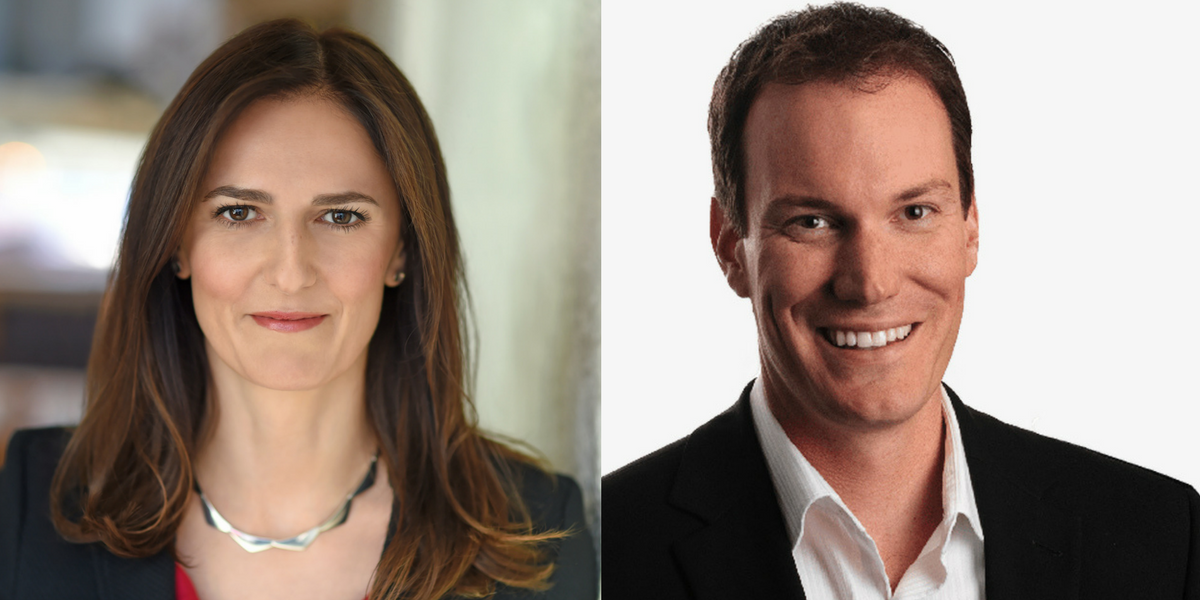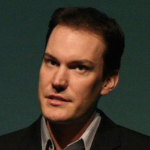Caroline Webb is the CEO of Sevenshift, author of How to Have a Good Day, and a former partner at McKinsey & Company whose work focuses on helping professionals use lessons from behavioral economics to be happier, healthier, and less stressed by the demands of a busy life. Shawn Achor is the founder of GoodThink, Inc., author of The Happiness Advantage and Before Happiness, and one of the world’s leading experts on the connection between happiness and success. Recently, Caroline and Shawn sat down for a Heleo Conversation on the changes they’ve made in their own lives as a result of their research.
This conversation has been edited and condensed. To view the full conversation, click the video below.
Caroline: Both of us are in the business of trying to help people be at their best, to thrive and be happier and more productive. I thought it would be interesting for us to talk about whether we take our own advice. What was the first big change that you made in your own life to become happier and more productive?
Shawn: I fell into this research backwards. I was at the divinity school studying ethics and people in the psychology department were saying, “You can study and quantify some of these positive changes. Come over and do it.” I started going out, speaking to all these companies. I was so lonely, traveling by myself—I’d see people for an hour, then I’d be gone again. I went to 33 countries in one year. My back literally broke.
While I was on a plane back from Switzerland, one of my vertebrae just disintegrated. I had to stand up the whole flight home. I laid down on the floor for six weeks and missed a trip to Africa. I knew the greatest predictor of long-term happiness—it’s the seminal part of my research—the greatest predictor of long-term happiness is your social connection. And I had none of it.
After this period, I went to Latin America. While doing some work down there, I saw people who were living under threats, like kidnappings and violence. Some of them could still be happy if they had social connection—their family, their deep friendships. That year, I realized that the big change I needed to make was to live [my research]. I moved from Boston down to the same street that my sister lived, in San Antonio, Texas, into a suburb with married families and kids. For me, that changed everything. I went from talking about happiness to actually living it.
Caroline: How quickly did it make a difference for you?
Shawn: Very quickly. I think people have pet problems—not just pet peeves, but things that they continually do, actions and behaviors trying to fill some void. For me, I don’t have high anxiety, but I feel loneliness. I’m gone for 24 hours and I feel it. That was one of the things I needed to solve, being good in solitude, meditation and things like that. It was also about building deep social connection, the deep relationships with my family but also breadth, like weak ties, friends that you don’t see all that much. Reconnecting with them was so important.
You’ve dealt with some of these challenges yourself. What’s the biggest change you made?
Caroline: About three years into my career at McKinsey, I had a similar crash. I got sick. I’d been traveling a lot, and my father was ill, in a hospital, and I was just stressed and juggling. It was a real eye-opener for me to realize that there was a genuine connection between mind and body. That was when I really first learned about the neurophysiology of stress.
I thought I was going to be off sick for two weeks—it turned out to be six months. Then I had to come back part-time, gradually, over the course of eight months, until I was strong again. Until then, my assumption had been that I was like a tank, my body was a container that I could abuse and it would be okay, more or less. It was a huge shift, to realize that I needed to look after my whole self if I was to be useful to anyone else.
“You don’t have to have a health crash to realize that you might want to change the way you live your life.”
My shift, then, went from working with huge companies on enormous [behavioral] change programs to becoming a lot more personal. I also started to think very hard about how to change my own life—not just talking about it, but [doing it].
It’s interesting what you said about social connection, because that was definitely part of it. If I was seeing a friend, I learned to treat that as being as important as any other meeting and not to cancel it any more than I would cancel a client meeting. The other thing was prioritizing sleep, and recognizing that it wasn’t a nice-to-have, that actually it was going to change everything. Then constructing an approach to work which was quite ruthless in prioritizing what matters most right now.
It’s funny how so often, change happens with this kind of crisis, like with your back. What we try to do is help people make change without crises happening. Honestly, you don’t have to have a health crash to realize that you might want to change the way you live your life.
Shawn: I love this idea of making your commitments to friends. I would never miss a meeting that I set up for work, so why would I prioritize that work relationship, which is less predictive of my happiness and well-being than connecting socially? On that point, I was just reading this morning about a study in the 90s where they asked NFL players if they would take a performance enhancing drug that would make them the best at their sport, but they would die five years later.
52% of them said that they would do it. The research paper was on how we glorify people: “You give up sleep, that’s amazing! You only sleep four hours a night? You must be super productive. You’re working 100 hours a week, you must be one of those super people.” We turn the superpower into something that doesn’t correlate with long-term levels of success or happiness or well-being at all.
You’ve been in the McKinsey environment. So many people want to be super successful. They’re surrounded by hyper-competitive people. How do you change it?
Caroline: Well, I kept thinking for a few years that somehow I would be found out. I needed eight hours of sleep to be at my best, and I was not much use after working 11 hours a day, when a lot of my colleagues were working 14, 16 hours a day. I felt like I was going to be found out as not being part of this tribe.
Shawn: You’re weak, yeah.
Caroline: Actually, what happened was my mindset shifted. I started to notice that I was getting as much done. I was doing fine. In fact, I was deeply motivated and excited by the work that I was doing. Over time, I started to be bold in talking about the choices that I was making, the boundaries that I was setting, about when I was and was not around, how much I was sleeping and how important that was. I think that started to be a small force for good around me, in telling people that it was possible to succeed in that environment while still keeping a sense of balance.
When I’m speaking at conferences, often people say, “I can’t tell anyone that I’m going offline. I’ve got to be online the whole time because they might need me.” Experiment and don’t be shy about saying, “This is what I’m doing in order to give more when I’m actually present.” What about you? Have you ever had to convince anyone else that what you’re doing is the right thing?
“Happiness is a personal choice, but it’s not an individual choice. It’s an interconnected one. Every time we choose it, we actually make it easier for other people around us to be more positive as well.”
Shawn: Yes, that’s why we have to have all this research. A lot of the things that we talk about are so common sense, but not common within the workplace at all. I’ve been experimenting with this. I’m a people-pleaser, so if I get an email, I feel like I have to respond to it. But if somebody knocked on my door, I’d be like, “Why are you knocking on my door?” So I’ve been starting to put up away messages: “I’m doing a writing retreat. I’m traveling right now. I’m spending time with my son.” I’ve gotten so many thank you e-mails from people that said, “It gives me license to try this out myself.”
Happiness is a personal choice, but it’s not an individual choice. It’s an interconnected one. Every time we choose it, we actually make it easier for other people around us to be more positive as well. We feel like we can say the negative stuff, “I’m stressed,” or “I’m working a whole bunch” but we wouldn’t want to say, “I’m really excited about something good.”
When you do that, other people start telling you the good things. It’s about giving license to that. These away messages have given me so much freedom. Have you tried stuff like that?
Caroline: Absolutely. When I was trying to build up my stamina after being sick, I was working two or three days a week. I was getting annoyed that people would be contacting me on the days that I wasn’t working. I had a very wise colleague who said, “They’re not trying to be jerks. They just don’t know what your routine is and when they can reach you and when they can’t. How about you just be a bit more explicit about your choices?”
The very first thing I did was to put a signature at the bottom of my e-mail saying when I was around. I use my “positive no” technique, as well. I say what I’m doing that is wonderful and exciting before saying, “And therefore, I’m not around just right now.” That helps me feel like I’m not just saying, “Go away.”
Shawn: I love having a child. I can always use him as an excuse: “I’d love to help you but I want to be a really good dad.” And it’s true. I do want to be a good dad. People give credence to that. They respect you for those decisions. I talked to this guy who was working in Germany with a team. He started with the whole, “I was up until 11:00 doing this work and in the office at 4:00 AM.” His German colleagues said, “If you’re working after 5:00, you were not as efficient as you should have been.” We perceive working longer as productive. That office saw it as inefficient, that you had to work when you should be having personal time and recharging.
The hardest thing for me is that as you become more successful and interact with more people, there is an increase in the amount of demands upon your time.
I talked to this professor at Harvard: “I can’t wait to get a PhD because then I can finally relax. I’ve been pushing so hard.” He said, “Undergrads think that, but then you get your PhD, and then you have to get a postdoc, and then work increases because you’ve got to get tenure. Then you get tenure—now you have all these committees and letters of recommendation. I’ve never worked as hard in my life as I do now that I’m tenured.”
When you become more prominent within a system, there are more demands. How do you deal with the fact that you have more demands on your time than you’re able to deal with?
Caroline: That’s the central question, the thing that I wrestle with most.
I think to myself: in three months, what will I want to have built or created in that time? That helps. If you can think of not trying to do everything all at once, but, “Which of the many things I might be doing is this particular chunk of time about?” it becomes easier to say no to the other things, because you’re not saying no forever. You’re just saying, “Right now, that is not what this is about.” What’s your technique?
Shawn: I read this book called Essentialism by Greg McKeown. Before getting into essentialism, he thought that it would be like, “These are the things I care about. It’s an easy no to everything else.” That’s not what essentialism is. Essentialism is saying no to things you really care about because you care about something even more.
I sometimes say no to a non-profit that I really want to speak to, but I already have too many talks and I’m away from my son and my wife. I don’t get to see my friends for tennis or play basketball. I’m gone every week. The thing that I finally concluded this year is that regardless of what I do, I can’t be everything. There will be sacrifices. I’m sacrificing right now practicing the piano, and that means I’ll never become a classical pianist—probably not just because of this conversation. But along the way, I made that decision.
Caroline: You’re making me feel terribly guilty. You should just go play.
Shawn: Every moment is a sacrifice. The key is to be okay with the sacrifices you make. The pain I was feeling was the pain of a divorce between “I’m doing this, but wish I was doing this,” that this sacrifice is not worth it. If I’m traveling too much, and it’s not worth being away, then I need to make a change. Those choices are personal. If I’m okay with it, great. As soon as I’m not, then I need to make a behavioral change.
“By stepping away from a topic, just as we do when we sleep or when we’re in the shower, we return to it with fresh eyes.”
Caroline: I remember the moment that I discovered that it didn’t matter how efficient I was going to be, that I was not going to ever finish my to-do list. It quickly flipped from being, “That’s terrible—life is really hard,” to quite liberating, because it’s never all going to get done.
Of all the advice, what do you find hardest to actually build into your routine?
Shawn: What I’ve been bad about is stepping back from things which would recharge me and give me creativity. Yet we know that the recovery period is one of the most crucial ones. Martin Luther, who started the Protestant Reformation, would take three hours every day to pray and to meditate. Somebody asked him, “You’re leading this reformation. How do you have time to do this?” He’s like, “I don’t have time not to do this. This is crucial to who I am.” How can I study happiness and not do things I know make me feel the most me? I’m most me when I’m in a coffee shop reading something that’s spiritual and uplifting. I need to be more of that person.
Caroline: That roundedness is crucial for your ability to connect and inspire other people.
Downtime is as important as uptime. I feel the same with singing. I joined a choir back in September. The number of hours that it takes each week is phenomenal. Some people have said, “Well, how do you fit it in?” The answer is, “Actually, this is helping me. This is giving my brain a rest.” By stepping away from a topic, just as we do when we sleep or when we’re in the shower, we return to it with fresh eyes. By immersing myself in something so completely different, I come back with something new intellectually.
Everything you do away from the computer is actually, in its own way, investing in whatever you’re able to do in front of the computer. It’s all part of who you are and the balance that you bring. The time you spend with your son, the time you spend playing the piano, that’s all infusing your writing and your speaking with something that is quite special.
The thing that’s hardest for me is, while I’m organized, I’m such a bad morning person that all of the advice on, “You should do these things before 8 AM,” is irrelevant to me. My brain doesn’t really function before 8 AM. I’ve always been skeptical of research and advice that is definitive and prescriptive about, “This is the best time to do this particular activity,” because it feels as if I live in a different timezone. Left to myself, I’d go to sleep at 3 AM.
Shawn: It actually might be detrimental for you to do some of those things before your time.
Caroline: I have no doubt. When I need to do things that require sophisticated thinking, I do that in the afternoon, not in the morning, which is the opposite of the advice that you tend to read. I am interested in work that hones in on people’s chronotypes. There was a study called something like “People are more moral in the mornings.”
A researcher who, like me, is practically a vampire, said, “That doesn’t sound right.” She re-ran the experiment, splitting people into early, average, and late chronotypes. Of course, she found the exact opposite, that for people who are late chronotypes, we make better choices later in the day.
“Being reminded that there are good things going on puts something back in your mind that should be there already. I need to hear these things over and over again. It’s not like you take a shower and you’re clean forever. You have to do it every day.”
Shawn: That’s fascinating. We live in an opinion age. Everyone has an opinion and a blog and advice. Too often, our opinions get turned into shoulds. Those shoulds then weigh us down, making us feel like we’re not as good as we should be. Instead of empowering us, they weaken us. I try to find things that fit with my strengths.
Caroline: You’ve got to find the ways of living that go with the grain of who you are. To that point, what are the things that you do every single day?
Shawn: I do gratitudes every day, because they remind me of what’s valuable. Being reminded that there are good things going on puts something back in your mind that should be there already. That’s why I love speaking, because I need to hear these things over and over again. It’s not like you take a shower and you’re clean forever. You have to do it every day.
Also I’ve been exercising every day. It’s the opposite of trauma—it keeps hitting me over and over again, a single positive event that keeps impacting me over the course of the day.
What about you?
Caroline: Ending the day by thinking about what went well. You’re hacking your memory of the day, and the way you remember the day becomes the way you think of your life.
Shawn: I love that. There are multiple realities every night when you go to sleep. One of them is you didn’t accomplish everything, because you can’t. You’re actually picking a more adaptive reality. It gives you that point of meaning each day. Our brains are pattern connectors. We start to see this whole trajectory of meaning running through our life.





























